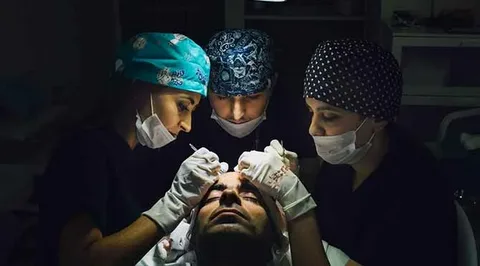Discover how to stop hair loss after surgery with expert tips on scalp care, nutrition, and treatment options to support healthy hair recovery.
Experiencing unexpected hair shedding after a medical or cosmetic procedure? You’re not alone. Understanding how to stop hair loss after surgery is essential for anyone facing temporary thinning due to anesthesia, physical stress, or scalp trauma.
At Dr. Uzma Irfan’s hair restoration clinic in Islamabad, patients benefit from medically proven solutions—including PRP therapy, scalp-focused care, and follicular unit extraction (FUE). As an ABHRS-certified specialist and active ISHRS member, Dr. Uzma Irfan provides evidence-based, ethical care to help you recover lost density and regain confidence—without unrealistic promises.

Why Does Hair Loss Happen After Surgery?
Reasons of hair fall after surgery :
Common Causes of Post-Surgical Hair Shedding
Hair loss after surgery is often caused by a condition called telogen effluvium, where stress forces hair follicles into the shedding phase. Contributing factors include:
- General anesthesia
- Nutritional deficiencies post-operation
- Inflammatory responses or scalp tension
- Hormonal changes or physical trauma
Knowing how to stop hair loss after surgery starts with identifying these triggers and tailoring the right treatment approach.
Top Treatments to Stop Hair Loss After Surgery
Wondering how to stop hair loss after surgery? Treatments like PRP therapy, FUE hair transplant, and targeted scalp care can effectively support hair regrowth and recovery.
1. PRP Therapy for Hair Regrowth
Platelet-Rich Plasma (PRP) therapy is a regenerative, minimally invasive option that uses the body’s own growth factors to stimulate dormant hair follicles. Dr. Uzma Irfan performs PRP under strict medical protocols to ensure optimal results with minimal discomfort.
2. FUE Hair Transplant (If Hair Loss Persists)
If hair loss becomes permanent in localized areas, Follicular Unit Extraction (FUE) may be recommended. This microsurgical technique involves extracting individual grafts and placing them into thinning areas with natural density and direction.
3. Nutritional and Topical Support
Supplements rich in biotin, zinc, and iron help address deficiencies that may contribute to hair thinning. Patients are also guided on gentle scalp care and prescription-strength topical options like minoxidil when appropriate.
What to Expect During Recovery
- Initial shedding is normal 2–4 weeks post-op.
- PRP sessions are spaced 4–6 weeks apart for 3–4 cycles.
- Most patients see improvement in 3–6 months.
- Surgical treatments like FUE require a few days of downtime but offer lasting density when indicated.
Understanding how to stop hair loss after surgery means knowing the timeline and choosing clinically supported treatments—not shortcuts or miracle products.
Who Is a Good Candidate?
Post-surgical hair loss can affect both men and women. Ideal candidates for treatment include:
- Patients recovering from general surgery or cosmetic procedures
- Individuals with temporary telogen effluvium
- Patients with persistent thinning suitable for PRP or FUE
- Those with no underlying autoimmune or scalp disorders
Dr. Uzma Irfan evaluates each patient through a personalized consultation in Islamabad to ensure safe, ethical recommendations.

Why Choose Dr. Uzma Irfan’s Clinic in Islamabad?
- Certified by the American Board of Hair Restoration Surgery (ABHRS)
- Active member of the International Society of Hair Restoration Surgery (ISHRS)
- Specializes in minimally invasive techniques like PRP and FUE
- Serves local patients in Islamabad and international medical tourists
From assessment to post-treatment care, the clinic offers a comprehensive, patient-centered experience rooted in medical integrity.
Book Your Consultation
If you’re wondering how to stop hair loss after surgery, don’t wait for the shedding to get worse. Take the first step by booking a one-on-one consultation with Dr. Uzma Irfan in Islamabad.
✅ Contact us today
✅ View before-and-after gallery
Frequently Asked Questions
How long does post-surgical hair loss last?
Hair loss after surgery usually resolves within 3–6 months if it’s telogen effluvium. Consistent care and supportive therapies like PRP can help speed up regrowth.
Is PRP effective for post-surgery hair loss?
Yes. PRP can stimulate healing and boost regrowth by activating dormant follicles through concentrated growth factors.
When should I see a specialist?
If you’re still shedding hair 2–3 months after surgery or see bald patches developing, it’s time to consult a certified hair restoration expert in Islamabad.
Can I prevent post-surgical hair loss?
While not all hair loss is preventable, proper post-operative care, nutrition, and early treatment can reduce its severity and support faster recovery.
Can stress from surgery really cause hair loss?
Yes, physical and emotional stress from surgery can trigger telogen effluvium, a common cause of temporary hair loss.
Hair loss after surgery can feel overwhelming, but with the right approach, it’s often temporary and treatable. Understanding how to stop hair loss after surgery starts with identifying the cause and taking timely, medically guided action.
At Dr. Uzma Irfan’s clinic in Islamabad, patients receive ethical, science-backed care through treatments like PRP therapy, FUE hair transplant, and customized recovery plans. Whether you’re a local patient or traveling for expert care, you’re in trusted hands. Don’t wait—reach out today to begin your hair restoration journey with confidence.
Follow us on Facebook, Instagram, and YouTube for expert insights and real patient stories.






